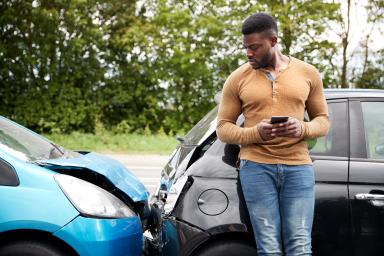New York Car Accident Laws

The New York City Police Department collision data listed over 8,000 motor vehicle collisions in December 2022. Nearly 3,000 motorists and passengers were injured, and several incidents resulted in fatalities.
U.S. News and World Report ranked NYC as the fourth most congested city in America, making it even more likely for drivers to experience an accident at some point.
To prepare for this possibility, drivers should take the time to learn more about New York car accident laws and legal resources, including:
Reporting requirements
Penalties for violations
Insurance requirements
Where to find important forms
How long they have to file a claim or lawsuit after an accident
How New York state’s no-fault insurance system works
By learning what to do after a car accident in New York, drivers can stay prepared, avoid violating any laws, and ensure they are able to recover from accidents as quickly and seamlessly as possible.
Reporting a Car Accident in New York
New York state law requires drivers to report any traffic accidents that result in a fatality or personal injury to the DMV. Drivers must also immediately notify the police if anyone is hurt or killed in a collision.
You are also required to report any car accident that results in $1,000 or more in property damage. All drivers involved in the accident need to file a Report of Motor Vehicle Accident (MV-104) form with the DMV within ten days of the date of the accident. Failure to file this report may result in the suspension of your driver's license.
Stay at the Scene of the Accident
If you are involved in a car accident in New York, you are required to stop, regardless of the extent of the damage.
According to the New York DMV, leaving the scene of an incident involving property damage is a traffic violation. It is a criminal violation to leave the scene of an accident that involves a fatality or personal injury.
Even if the incident only results in property damage, you must exchange information with the other driver, including your name, address, driver’s license number, vehicle registration, and insurance information. You should also be prepared to share this information with the police. If requested, you must also present your insurance identification card.
Comparative Negligence in New York
New York follows a pure comparative negligence rule. While New York is a no-fault state, some exceptions allow drivers to sue for damages. In these cases, the other driver may have to pay for your medical bills, lost wages, vehicle repairs, and other economic and non-economic damages.
Under the pure comparative negligence rule, the court jury may decide that both parties are partially responsible for an accident. In these circumstances, the jury will calculate the dollar amount of damages the victim sustained and the percentage of fault to assign to each party. The plaintiff’s award is then reduced by a percentage equal to their share of fault.
This rule still applies if you are found to be more responsible for the collision than the other driver. For example, if you sue another driver and are found to be 80% at fault for the accident, you are still entitled to 20% of the damages you sustained. However, this also means you must pay 80% of the other driver’s damages.
Car Accidents Involving a Parked Vehicle
If you strike a parked vehicle, New York law requires you to try to find the owner, remain on the scene, and notify the police. Make sure to move your vehicle to the side of the road, if possible, to avoid blocking traffic. This law also applies to accidents that result in the death or injury of a domestic animal.
Driving Without Proof of Insurance
New York requires all drivers to carry auto insurance to drive a vehicle legally. Car insurance companies in the state are required to notify the DMV whenever your liability coverage starts or ends.
If you let your coverage expire without renewing or purchasing a new policy, you are required to turn over your license plates to the DMV.
If you or another person is caught driving your uninsured vehicle, penalties may include the following:
Arrest
Vehicle registration suspension
Impounding of vehicle
You may also face fines that vary depending on how long you have been without insurance:
If your insurance has expired for more than 90 days, your license will be suspended for the same duration as your registration, and you will have to pay $50 to reinstate your license.
Drivers involved in traffic accidents while driving without insurance may have their licenses and registrations revoked for an entire year.
CARCO Inspection
New York is one of few states requiring CARCO inspections for certain types of coverage, including comprehensive and collision coverage. These are independent inspections that verify that your vehicle exists and evaluate its condition, mileage, accessories, and options.
During the inspection, photos are taken of your vehicle to include in the report sent to your insurance company. CARCO inspections are free and do not require any documents or paperwork.
Diminished Value
After an accident, your vehicle’s resale value decreases even if it is restored to its pre-accident condition.
New York allows drivers to receive compensation for diminished value after a car accident. Drivers can file a diminished value claim against the at-fault driver’s insurance company to make up for the losses they might experience when trying to sell their car in the future.
Certain requirements must be met to file a diminished value claim:
You are not the at-fault party.
You must be able to provide documentation to support your claim, including photos, repair records, and proof of value for your vehicle.
It has been less than three years since the date of the accident.
New York also has uninsured motorist coverage for diminished value claims.
New York Auto Insurance Requirements
All drivers in New York must have auto insurance to operate a motor vehicle legally and must have proof of coverage at all times when driving.
New York’s minimum auto insurance requirements are as follows:
Liability Coverage (25/50/10): $25,000 for bodily injury per person; $50,000 for bodily injury per accident; $10,000 for property damage per accident
Personal Injury Protection (PIP): $50,000 per person
Uninsured/Underinsured Motorist Coverage (25/50): $25,000 for bodily injury per person; $50,000 for bodily injury per accident
Liability coverage pays for bodily injury and property damage you cause to another driver or passengers after an accident, regardless of who was at fault.
PIP coverage, also known as no-fault coverage, pays for your and your passengers’ medical costs after a car accident.
Uninsured or underinsured motorist coverage pays for injury and lost wages for you and your passengers if you are hit by a driver who does not have insurance or does not have enough coverage to pay for all the damages you sustain.
Each of these coverages is required under New York law, and drivers risk facing fines and having their licenses and registrations revoked if they are in an accident while driving without liability insurance.
Drivers may also choose to add several optional coverages to their policies, including:
Comprehensive coverage: Pays for damages your vehicle sustains from incidents other than collisions. It also covers collisions with animals.
Collision coverage: Pays for damages to your vehicle after colliding with a car or a fixed object.
Gap coverage: This covers the difference between the actual cash value of your vehicle and the amount left on your auto loan to account for the depreciation of your vehicle.
Medical payments coverage: Pays for medical bills and funeral expenses for you and your passengers, regardless of who is at fault.
Roadside assistance: Covers the costs of tow trucks, jump starts, and related services if your vehicle breaks down while driving.
Rental car reimbursement: Reimburses you for rental car costs if your vehicle becomes inoperable after a traffic accident or another covered loss.
While New York does not require drivers to purchase these coverages, they offer broader protection, making them an important consideration for those that can afford them.
How Much Can Someone Sue For a Car Accident in New York?
Since New York is a no-fault state, drivers must first file a claim with their own insurance company to get compensation after a car accident. Filing a claim with your insurance company may allow you to receive reimbursement for necessary medical bills, lost wages (up to $2,000 per month for three years), and $2,000 in death benefits to the estate of the driver if the covered driver died as a result of the accident.
However, in certain circumstances, drivers may be able to file a claim against the other driver’s insurance and file a lawsuit.
To do this, you generally need to have sustained severe and permanent injuries, including:
Disfigurement
Broken bones
Substantively full disability for 90 days
Limitation of a body system or function
Permanent impairment
In these cases, drivers may sue for economic (e.g., medical expenses, lost wages, vehicle repairs) and non-economic damages (e.g., pain and suffering). A driver’s family member may also sue another driver if an accident results in the death of a loved one.
There is no specified limit on how much someone can sue for a car accident in New York. The total you receive will depend on the extent of the damages you sustained and your ability to prove the other driver was responsible for the accident.
As a comparative negligence state, New York adjusts awards depending on how much each driver is said to be responsible for the accident. For example, if you suffer $50,000 in damages after an accident but are found to be 40% responsible for the accident, you would be eligible to receive 60% of the total damages — $30,000.
The Statute of Limitations in New York
After a car accident, you have limited time to file a lawsuit against another driver. This is called a statute of limitations.
The statute of limitations for filing a lawsuit after a car accident in New York is three years, starting from the day of the accident. If you try to file a lawsuit after this time period has passed, the court will more than likely dismiss your case unless a rare exception applies to your specific case.
If you’ve been in a car accident in New York and believe the other driver to be at fault, you should contact your lawyer to discuss your situation and begin your case as quickly as possible. Delays may result in you missing your chance to file a lawsuit before the statute of limitations expires.
Is New York a no-fault state?
New York is a no-fault state. As one of the few states to have a no-fault car insurance system, New York requires drivers to file claims with their own insurance companies after an accident to receive compensation for damages, regardless of who is responsible for the crash.
Legal Resources for New York Car Accident Victims
If you have been in a car accident in New York, it’s important to know what steps to take next in order to comply with state law and begin your recovery.
There are many online resources available to help drivers understand their rights, what to do after an accident, and how they can seek reimbursement for the damages they sustain.
New York State Bar Association
The New York State Bar Association (NYSBA) offers several public resources to help residents understand complex legal issues.
Through the NYSBA website, users can access LEGALease Online — a collection of pamphlets prepared by various sections, committees, and members of the NYSBA to provide the public with helpful information regarding different areas of New York state law.
This resource includes a pamphlet explaining what drivers in New York should do after an accident. This pamphlet discusses important information, including when to call the police, how to report an accident, what information to collect, and when you may be able to sue for personal injuries.
Visit: nysba.org
New York DMV
The New York DMV gives users access to resources covering important topics like what to do after a car accident, circumstances in which your license may be revoked, laws regarding sharing the road with other drivers and pedestrians, and more.
Drivers can also visit this website to learn how to get a driver’s license, register a vehicle, renew their registration, or change the address on their registration. You can order your driving records online, file an accident report, and search for accident reports that have been filed in the past four years.
Visit: dmv.ny.gov
New York City Police Department
The New York City Police Department (NYPD) allows NYC residents who have been in a car accident to access a selection of useful resources online.
Drivers can find and download the Collision Information Exchange form, learn more about what to do after a car accident, and find answers to frequently asked questions about non-injury collisions.
You can also visit the website to request a copy of your collision report online, which may be useful for drivers attempting to file a claim or a lawsuit after an accident.
Visit: nyc.gov
Free Legal Answers
New York Free Legal Answers is a virtual legal advice platform. Qualifying users are able to post legal questions to be answered by pro bono attorneys licensed in New York state. The American Bar Association created this project to make legal advice more accessible to the public.
If you have been in a car accident or another type of incident involving a motor vehicle, Free Legal Answers may help you better understand what your rights are and what steps you should take next.
Visit: ny.freelegalanswers.org
Expertise.com StaffAuthor
Step into the world of Expertise.com, your go-to hub for credible insights. We don't take accuracy lightly around here. Our squad of expert reviewers, each a maestro in their field, has given the green light to every single article you'll find. From rigorous fact-checking to meticulous evaluations of service providers, we've got it all covered. So feel free to dive in and explore. The information you'll uncover has been stamped with the seal of approval by our top-notch experts.

Vladimir TamayeffReviewer
Vladimir Tamayeff is an experienced New York car accident attorney; his entire legal team has an unparalleled passion for justice and an unbridled dedication to getting their clients the compensation they deserve after an injury. Visit: https://www.vtlawpc.com

![Airbag Injuries and Average Settlement Amounts [2023]](https://images.ctfassets.net/k00sbju4hbzq/3BBaoZsvlj0NDySlMekb5V/aae10f65f969b6faf29ccfbee387c4d4/Depositphotos_61460709_XL.jpg?fit=fill&w=384&q=75)
![Average Car Accident Settlements [2023]](https://images.ctfassets.net/k00sbju4hbzq/4BBkDDWAQT0dL8I9OSMFnt/36439fec4b6260a58e0c384f64809566/Depositphotos_335949804_XL.jpg?fit=fill&w=384&q=75)
![Can I File a Lawsuit if the Car Accident Was My Fault? [2023] DUP IMAGE](https://images.ctfassets.net/k00sbju4hbzq/KjM0u9gm0nmPN9Agv7fih/5a7d1f7c763eada5c66e5547e6e487e1/Depositphotos_341258876_XL.jpg?fit=fill&w=384&q=75)
